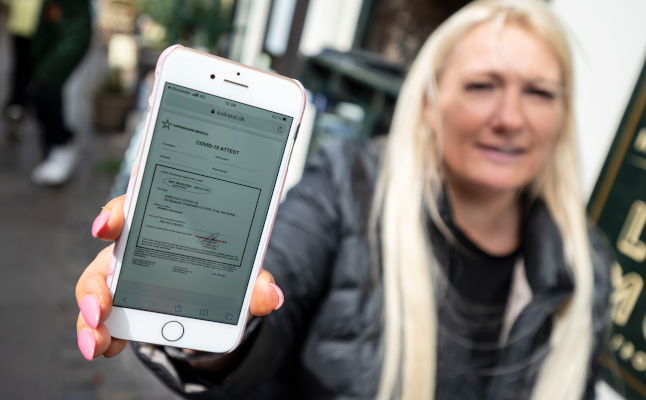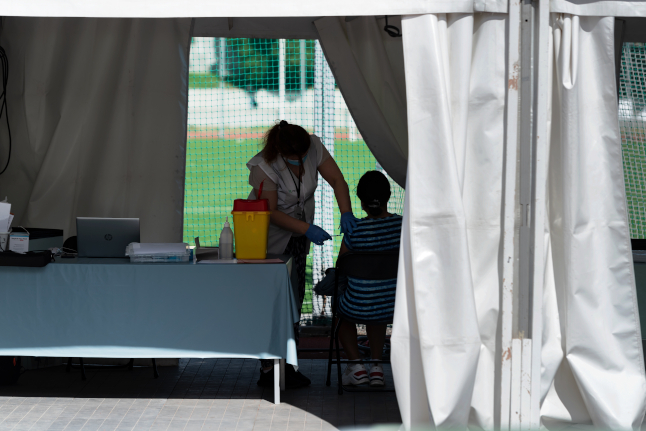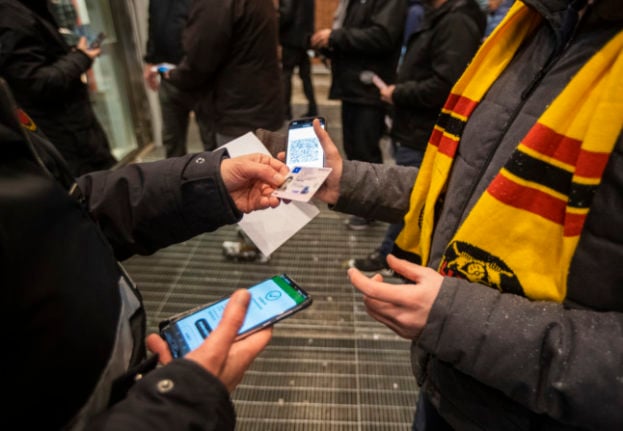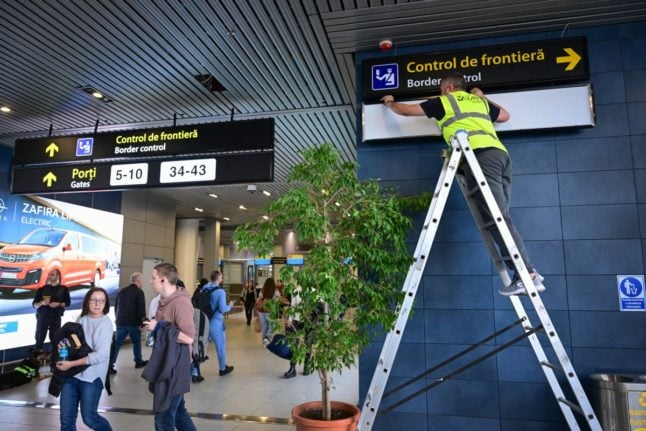In 2021, Sweden was ranked the third most advanced digital economy in the EU, behind only Denmark and Finland. But in many ways it has also fallen behind its European neighbours during the pandemic, with several tech solutions introduced much later or not at all.
It is, for example, one of only four countries in the EU never to have launched an official contact tracing app. The others are Bulgaria, Romania and Slovakia.
So why is tech-savvy Sweden lagging behind?
A lot of the problems have been political rather than technological.
Sweden’s Civil Contingencies Agency (MSB) spent six million kronor (approximately $662,000) developing a contact tracing app in April 2020, but failed to clear it with the Public Health Agency, which then vetoed it the following month. And so, the app was never launched.
At the time, state epidemiologist Anders Tegnell argued Sweden had “too much infection”, so a contact tracing app would overwhelm health services and force too many necessary workers to stay home. MSB said that “uncertainties around data storage and users’ anonymity and privacy” had also been an issue.
A source who was involved in the early stages of the aborted contact tracing app argues that the resistance to digital solutions follows a pattern seen throughout the pandemic.
“They were very sceptical of how efficient contact tracing apps were, and I think it’s in line with a lot of other perspectives during the crisis,” he tells The Local. “It’s the same with the masks: ‘without a systematic scientific evaluation, we cannot recommend anything’.”
What about vaccine passes?
The slow response also extends to Covid vaccine passes, with thousands of fully vaccinated foreigners still unable to get their vaccinations validated in Sweden.
When Sweden first launched its version of the EU Digital Covid Certificate, Covidbevis, it came as a simple PDF (online or print) with no accompanying app, and it was only available on July 1st, the absolute deadline and long after many other EU countries.
At first the Swedish version of the Covid pass could only show vaccination status. It wasn’t until the start of August, when most people’s holidays were over, that Swedes could get an EU Digital Covid Certificate on the back of a negative test or proof of recovery. Again, this was right on deadline and months after most other EU countries.
The Public Health Agency was initially sceptical of the value of vaccine passes, and at the time the certificates were only used for travelling to Sweden from abroad without restrictions. When countries like France, Germany and Denmark started to also require them to enter restaurants and events, Tegnell argued this was ethically problematic as many people had not had a chance to get the jab.

Sweden eventually rolled out vaccine passes to large public events on December 1st, and the government is now preparing to possibly extend them to venues such as restaurants and long-distance public transport. It also tasked the Agency for Digital Development (DIGG) with developing a new vaccine app that event organisers can use to verify their attendees’ vaccinations.
“It’s not like we were late with developing something,” protests Mats Snäll, who led the work on the app, which was ready on November 30th.
His 20-person team did the job in two and a half weeks, he adds. “We developed this app when the government told us to, and they thought it was a good idea now and not earlier. It is not the most beautiful app in the world. But I think it suits its purpose.”
In fact, his team also developed a system for verifying test status and recovery from Covid back in July, so the fact that the app lacks this capability reflects a decision from the Public Health Agency to focus on vaccine passes, not a technological limitation.

The decentralised digital approach
Blame for Sweden’s slow digital response cannot solely be laid at the door of the Public Health Agency. Sweden’s decentralised approach, with every municipality, region and government agency responsible for their own digitisation, is arguably a big culprit.
Denmark’s version of DIGG, the Agency for Digitisation, was launched in 2011 with some 300 staff and a powerful mandate. DIGG was launched in 2018, has only a third as many employees for a country with twice the population, and has no powers to impose its solutions on agencies or local governments.
“They’ve made the right decision,” Johan Magnusson, professor of applied information technology at Gothenburg University, says of the Danish approach.
“They’ve created somebody in charge and made sure that there’s enough funding to be able to create not 290 individual solutions out in the country, but just one. They utilise the logic of digital: massive economies of scale and zero margin cost,” he adds.
That Sweden hasn’t done this, he argues, reflects the “Swedish government model”, which leaves agencies and regions responsible for day-to-day decisions and frowns on ministerstyre, “ministerial rule”, when ministers micromanage government agencies.
It was this fragmentation that arguably led to the clash between MSB and the Public Health Agency over the contact tracing app. It is arguably the reason why DIGG could not take its own initiative and launch a vaccine pass app before it was asked to by the government. It also part explains the issues faced by those foreigners who are unable to get a valid vaccine certificate, despite being fully vaccinated.

As The Local has been reporting since summer, people who got both of their vaccine doses abroad or who don’t have a personal identity number (personnummer) have faced obstacles or even been unable to get a Swedish vaccine pass. Although Sweden is hardly the only EU country where non-residents have encountered problems, it is a hurdle that was cleared in many other countries long ago.
The e-Health Agency, which has been in charge of issuing Covid certificates, told The Local in July that the problem faced by those who don’t have a personnummer came down to difficulties connecting the population registry databases and vaccinations.
The situation was resolved for some of these people in autumn, but for people vaccinated with a temporary reserve number, it is more complex, as reserve numbers are only unique by each region, so vaccinations can’t be matched up to a person and their name on a national level. The Health Ministry told The Local in November that they plan to roll out a solution on January 1st, six months after the passes were launched.
Swedish residents vaccinated abroad have also been unable to get their foreign vaccine certificate converted to a valid Swedish vaccine pass. This problem is due to the set-up of the National Vaccination Register (NVR), which is managed by the Public Health Agency.
“Denmark has had a national vaccination repository for several years [which] can also handle information about vaccinations done in other countries,” explains Jan Pettersson, a communications officer at the e-Health Agency.
“The Swedish national vaccination registry is a health data registry governed by a different type of legislation, which contains only certain vaccinations done in Sweden, and the information can only be used for statistics and research.”
It took a change in legislation to enable the registry even to be used for the Covid-19 passes, he adds. The registry can still not be accessed by regional health authorities for anything other than statistical purposes, which explains some of the administrative issues above.
It’s not that Sweden isn’t aware. The e-Health Agency and the Public Health Agency as early as June 2020 proposed a move to a Danish-style system, which would allow doctors employed with regional health agencies to manually add vaccination data. The next step now is for the Health Ministry to decide which government agency will be responsible for verifying vaccinations administered in third countries.

Constitutional changes?
Gothenburg University’s Magnusson argues that overcoming some of the barriers to digital government thrown into sharp relief by the pandemic will require carving out exceptions to Sweden’s decentralised system set up by Lord High Chancellor Axel Oxenstierna in the 17th century, something he says Finland, which has a similar system, is already working on.
“It’s a major problem that there’s no central authority, so you find everybody running in the wrong direction at once,” he explains. “But to change it, you need to change the constitution, and that’s something no government has been willing to do.”



 Please whitelist us to continue reading.
Please whitelist us to continue reading.
Thank goodness Sweden did not introduce a test and trace programe, has a decentralised system of government (albeit one requiring a centralised auditor general’s office to audit government expenditure at all levels of government and ensure national legislation is adhered to) and a consitution that kept politicians at arms length in the handling of Covid. As Richard Orange must know, test and trace in the UK had been a horrendously expensive disaster according to the Public Accounts Committe of MPs (£37 billion at last count), and the UK’s heavily centralised National Health Service has proven itself to be incapable of orchestrating a coherent response to the pandemic. To adapt Ruyard Kipling “Anders Tegnall kept his head when all about him were losing theirs” and thank goodness for Sweden he did. He should be awarded the Nobel Prize for Medicine. If other European countries had followed Sweden’s approach Europe’s death rate from Covid would have been much much lower. Hundreds of thousands of lives would have been saved. Only Iceland did better. See https://qap.ecdc.europa.eu/public/extensions/COVID-19/COVID-19.html#eu-eea-daily-tab
Really? How do you explain that the death rate in Denmark is about 3x less than Sweden? Tegnell is the one who praised the swine flu vaccine, causing some 500 children having narcolepsy to save few hundred people. Which would be just a mishap if the UK and the US had not prohibited the use of that vaccine judging it too risky. So let’s celebrate his original thinking. When everyone was advising about using masks he said no, because, amidst a pandemic emergency, he was waiting for some peer reviewed article to prove they work. Whereas a bit of common sense would dictate to prove that they are dangerous or even amplify the spread of the disease. No, wash your hands, stay home with symptoms, which is a stroke of genius when we all know that C-19 is an airborne disease and that a third of the cases go asymptomatic. With covid he’s experimenting his latest original idea: a sort of herd immunity in disguise, but all seem happy with “the genius”, after all the way people behave is just the result of FHM and Government initial narrative and the fact that noboday looks outside their countries (true everywhere). I argue that with a bit more of attention, and looking at what other countries are doing, maybe cherry-picking the best actions, and with not such a spineless government, several fragile lives could have been saved. Since you quote Rudyard Kipling, let’s say that he could have the Nobel Prize for Medicine “IF” he was a scientist. You praise decentralisation, however the vaccination program is not particularly handsome isn’t it? They are also stingy with information: the FHM page (indigestible on purpose) has NO info on the 3rd dose progress, but if you find it I am happy to be disproved. You can have ONE running point on ourworldindata, whereas every other country give you a full graph from September, day by day. No, Sweden is one point that is adjourned every week or so, if you are lucky: previous history is cancelled, so no way to make a projection into the future! Info on newspaper is pathetic: easier to find what Carola will put on her julbord this year. Scarce mentions on Omicron, and what to do about it. The beast has a 24 doubling rate in the UK and the US, and all point at the necessity of a third dose ASAP. As of today we vaccinated 14.4% of the population with the booster. Now they open to 60+ … in Italy they are doing 50+, UK even more advanced. Do you think that Swedes have special genes or simply tests are not done in large enough numbers? I am so concerned for my wife who needs to travel for work, spending 5 hrs there and back surrounded by people who don’t give a toss to protect themselves because “the genius” is experimenting his theories. Tegnell Nobel for Medicine would have made my day if this matter was not too serious not to be seriously worried about it.
Test and Tracing in many countries Worked very well. A good example is Singapore with like 5.5 million population and rather dense. If it was horrendous in UK, we also have to realize their population of 66 million and the density. Sweden has neither a large population, nor is it dense but more spread out. Track and trace would have worked well, and possibly helped save a few thousand lives with this cautionary measure…. but of course other cautionary measure are also very necessary like Face masks in public indoor areas.
+1 to the article
I am a French resident. I come to Sweden on a regular basis for months at a time to visit family. I was double vaccinated in France, and received my third, the booster, here in Stockholm. I needed to get this because I was informed by the French health service, which has a really good app and really good digital communications, that since I was 7 months out from the second vaccination snd at my age, over 65, I needed the booster. Now I wished I had delayed since it is such a problem to get the certification. I cannot hope to return to France without this proof. First I had to get a coordination number. Then I had to send it with a form to Covidbevis. Now apparently I have to wait weeks and weeks because there is such a backlog of people like me. This is shockingly bad and so easy to rectify and should shame Sweden. In fact Sweden’s response overall to the pandemic continues to be woeful. Compared to other Nordic countries it has failed. Tegnell should be sacked. The government should stop passing the buck. Get a grip, Sweden.
As a resident of Sweden for a short period of time, although a passport holder for 12-13 years I am extremely glad that we had Anders Tegnall. We have now experienced less Covid folk than other countries. Put that in your pipe and smoke it.
Whatever you are smoking is affecting your reasoning. Sweden’s response has been woeful and it has admitted that. Deaths per million Sweden = 1490; compare Denmark = 522; Norway = 219; Finland 260. Sweden’s poor showing is clear.
The Swedish “covid strategy” sucked and still sucks, because for some very weird reason, we have a “dictator” in Anders Tegnell.
Why oh why does just ONE man, who has proved over and over and over again that he knows nothing, have the say?
This Pandemic has shown the to the world, how bad the system is in Sweden. The past good reputation has gone to the dogs.
But I think Sweden is just too arrogant and adamant to admit failure.
They think by doing “sneaky” things, eg when they stopped testing people with symptoms a few months ago, it was to show the world and the population here that ” we are the best ” as the statistics showed Sweden to be the “lowest” rate of infection when that was so untrue – to make it seem like the “no strategy, stragegy” was the best in the world.
Is this the Democracy they brag about?
I, too, have been surprised, and disappointed by Sweden’s approach. But, I think it is more like complacency than arrogance. Tegnel may well be arrogant, but it is complacency among the citizens that permits all this. At least there are more people wearing masks on public transport, but really not nearly enough. Its ‘save yourself’ time on this ship.